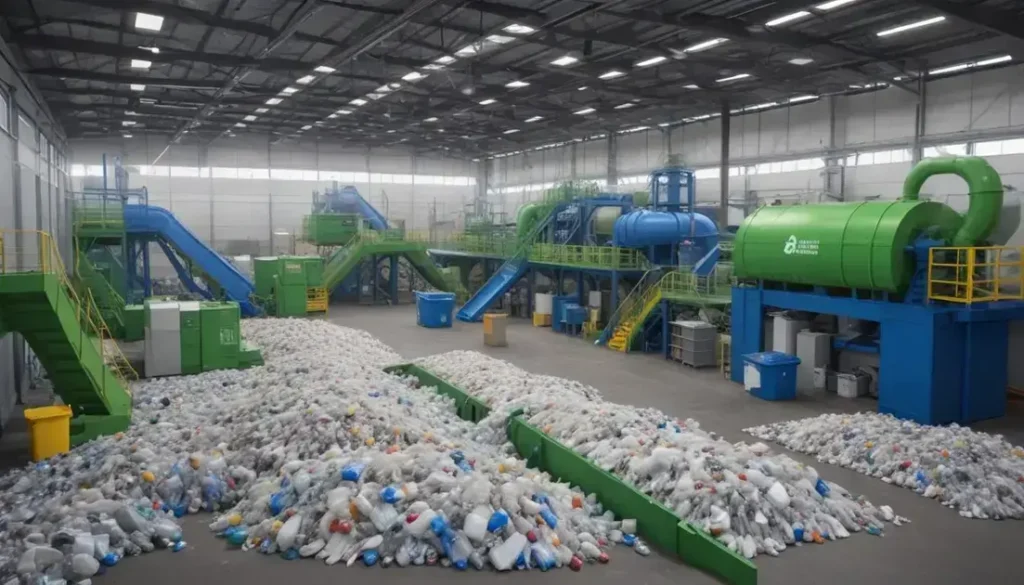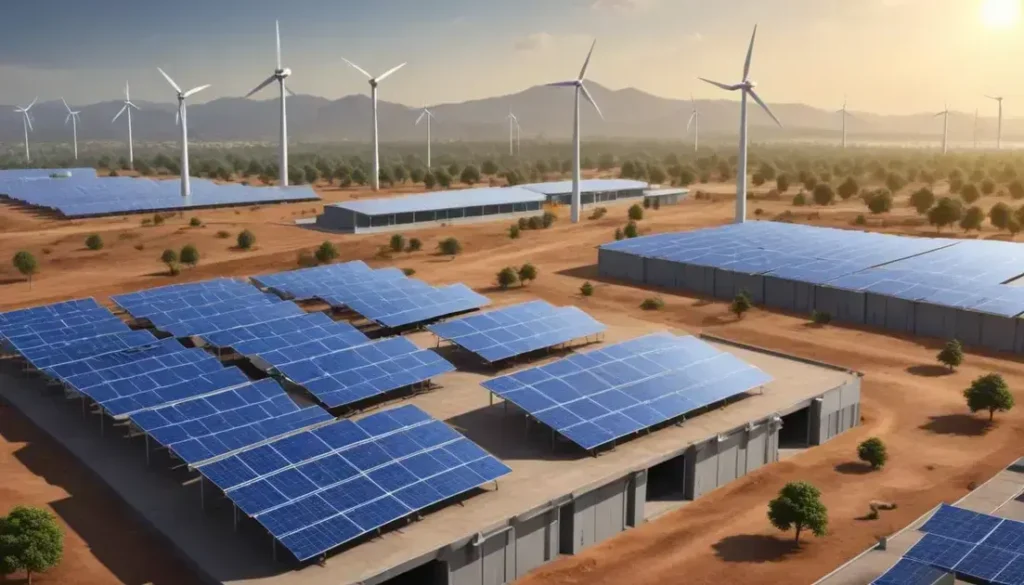The energy transition significantly impacts economies and businesses by fostering job creation in the green sector, promoting innovative sustainable practices, and emphasizing the importance of renewable energy while encouraging stakeholders to engage in inclusive growth strategies.
The Energy Transition is reshaping markets worldwide, with significant implications for businesses. Are Indian firms prepared to navigate these changes?
The Future of Energy Transition
The Future of Energy Transition is pivotal for achieving sustainability goals. Countries worldwide are shifting towards renewable energy sources, such as solar and wind, to tackle climate change. This movement not only reduces greenhouse gas emissions but also diversifies energy portfolios, enhancing energy security.
Investments in renewable energy technologies are on the rise, leading to innovative solutions and job creation. Indian firms should leverage these advancements to align with global trends. As renewable infrastructure develops, opportunities for Indian businesses to expand into this market also grow.
Moreover, the transition presents challenges, including the need for updated regulations and policies that support a smooth shift from fossil fuels. Companies must stay informed about these changes to position themselves strategically. Engaging with policymakers and industry experts can provide valuable insights into navigating this landscape.
The integration of smart technologies in energy systems is also transforming how we consume energy. Smart grids and energy storage solutions enhance efficiency, making renewable energy more reliable. It’s important for businesses in India to explore these technologies, as they offer a competitive edge in a rapidly evolving market.
Keynote Speakers at the Panel
Keynote speakers at industry panels play a vital role in shaping discussions about the future of energy transition. These experts bring invaluable insights from their diverse backgrounds, helping to inform and inspire participants. Their experiences and knowledge often highlight innovative solutions to current challenges in the energy sector.
Having thought leaders speak at these events fosters dialogue that can lead to actionable strategies. By sharing their experiences and case studies, keynote speakers provide valuable context to complex topics, making them more accessible to the audience. This engagement is crucial for encouraging collaboration and driving forward critical discussions on sustainability.
Moreover, keynote speakers can bridge the gap between research and practical application. Their ability to translate complex technical jargon into engaging narratives ensures that attendees leave with a clearer understanding of the issues at hand. This clarity is essential for businesses looking to implement effective strategies in energy transformation.
Many panels also encourage audience interaction, allowing participants to pose questions directly to the speakers. This dynamic exchange enhances learning and fosters a community of knowledge sharing. Ultimately, the insights delivered by keynote speakers can significantly influence how companies approach the energy transition and sustainability challenges.
Challenges in the Energy Sector
The challenges in the energy sector are multifaceted and require innovative solutions. One major obstacle is the dependence on fossil fuels, which continues to dominate the energy landscape. This reliance not only hinders progress towards sustainability but also exposes economies to volatile price fluctuations.
Apart from financial issues, infrastructure limitations pose significant challenges. Many regions lack the necessary infrastructure to support renewable energy technologies. Upgrading existing systems and integrating new technologies can be a daunting task for both governments and businesses.
Another pressing challenge is the need for regulatory reforms that support the transition to renewable energy. Existing regulations are often outdated, making it difficult for companies to adapt to new market dynamics. Policymakers must collaborate with industry leaders to create frameworks that encourage investment in sustainable practices.
Additionally, public perception and societal readiness for change are critical. Misinformation about renewable technologies can lead to skepticism, hindering adoption rates. Education and awareness campaigns are essential to address these gaps and promote a positive outlook towards the energy transition.
Lastly, ensuring energy security while transitioning to green technologies is vital. Balancing the need for reliable energy supply with environmental goals requires strategic planning and collaboration across various sectors.
The Role of Renewable Energy
The role of renewable energy in today’s world is increasingly vital as nations strive for sustainability. Renewable energy sources, such as solar, wind, and hydro, provide cleaner alternatives to fossil fuels. These resources not only reduce greenhouse gas emissions but also support economic growth through job creation in emerging industries.
Transitioning to renewable energy is essential for energy security. By diversifying energy sources, countries can reduce their dependence on imported fuels, creating a more resilient energy landscape. This shift can significantly enhance national security and stability.
Moreover, renewable energy contributes to environmental conservation. Sustainable energy practices help preserve natural resources and ecosystems by minimizing pollution. Implementing such technologies fosters a healthier environment for future generations.
Innovations in renewable energy technology are accelerating this transition. Advancements in energy storage solutions enable more efficient use of renewable sources, making them viable alternatives to traditional energy options. As these technologies continue to evolve, they will open new avenues for businesses and consumers alike.
Finally, government policies and incentives play a crucial role in promoting renewable energy adoption. Supportive frameworks can drive investments and facilitate the integration of renewables into existing energy systems. Ensuring a robust pathway towards a sustainable energy future is imperative for achieving global climate goals.
Innovative Technology in Energy Transition
Innovative technology plays a crucial role in the energy transition, driving the shift towards sustainable energy sources. Technologies such as smart grids enhance the efficiency and reliability of energy distribution, allowing for real-time monitoring and integration of renewable energy sources.
Energy storage solutions, particularly advancements in batteries, are vital for balancing supply and demand. These systems enable the storage of excess energy generated from renewable sources, such as solar and wind, which can then be used during periods of low generation. This capability is essential for ensuring a stable energy supply and enhancing grid resilience.
Furthermore, innovations in solar panel technology have led to increased efficiency and decreased costs. With the development of bifacial and transparent solar panels, the potential for energy generation has expanded, making solar energy a more viable option for both residential and commercial applications.
Wind energy technology has also evolved significantly, with larger and more efficient turbines being deployed. These advancements improve energy capture and reduce the cost of wind energy production, making it an attractive alternative to fossil fuels.
Ultimately, the convergence of these technologies will accelerate the energy transition, making sustainable energy solutions more accessible and affordable. As businesses and governments invest in these innovations, the future of energy looks promising and sustainable.
Expert Insights on Policy Changes
Expert insights on policy changes in the energy sector are crucial for understanding the landscape of renewable energy adoption. Policymakers play a pivotal role in shaping regulations that promote sustainable practices. Their decisions can significantly influence investments in clean energy technologies.
Key regulations will often focus on emissions reductions, renewable energy targets, and incentives for businesses transitioning to greener practices. Experts argue that clear and stable policies are essential for attracting private investment in renewable energy projects. Incentives such as tax credits and subsidies can encourage businesses to innovate and adopt sustainable technologies.
In addition to economic incentives, experts emphasize the importance of international collaborations in policy-making. Many countries are forming alliances to share best practices and technology advancements. By working together, nations can create more robust frameworks that facilitate the global energy transition.
Additionally, it’s vital to consider the socioeconomic impacts of these policy changes. Experts highlight that successful energy transitions must address issues of equity and access, ensuring that marginalized communities benefit from new green initiatives. Engaging with various stakeholders, including local communities, is essential for developing comprehensive energy policies that are inclusive and effective.
Overall, expert insights on policy changes can pave the way for a more sustainable energy future, guiding businesses and governments alike in their quest for renewable energy adoption and environmental stewardship.
Investment Opportunities in Renewable Energy
Investment opportunities in renewable energy are rapidly expanding as the global focus shifts towards sustainability. Investors are increasingly looking for avenues that not only offer financial returns but also contribute positively to the environment. The growing demand for clean energy sources presents numerous opportunities in sectors such as solar, wind, and bioenergy.
Solar energy, in particular, has seen significant growth due to falling costs and technological advancements. Investors can participate in large-scale solar farms or small-scale residential installations, making it a versatile investment option. Additionally, the rise of energy storage solutions complements solar projects, creating further investment potential.
Wind energy is another promising sector, with advancements in turbine technology leading to higher efficiency and reduced costs. Offshore wind farms, in particular, are gaining traction, enabling investors to capitalize on vast, untapped energy resources.
Emerging markets also offer lucrative opportunities for investment in renewable technologies. Countries committed to enhancing their renewable energy capacities are often supported by international funding and government incentives. This support provides a favorable environment for investors seeking to enter new markets.
Furthermore, impact investing in renewable energy projects is becoming a popular choice. Investors are increasingly aware of their social responsibility and are looking for ways to align their portfolios with their values. This trend is set to drive even more capital into the renewable energy sector.
Global Partnerships for Sustainable Growth
Global partnerships for sustainable growth are essential in addressing the complex challenges posed by climate change and environmental degradation. Collaborative efforts between nations, businesses, and organizations can lead to innovative solutions that promote renewable energy and sustainability.
Such partnerships often focus on sharing knowledge and expertise, enabling countries to learn from one another’s experiences. For instance, developed nations can provide technological advancements and resources to developing countries, fostering a more equitable energy transition. This exchange not only helps in implementing effective sustainable practices but also boosts economic growth in emerging markets.
Moreover, international collaborations play a vital role in accessing financing for renewable energy projects. Global funding mechanisms, such as the Green Climate Fund, aim to support initiatives that reduce emissions and enhance resilience to climate change impacts. By leveraging these resources, countries can invest in clean technologies and infrastructure development.
Furthermore, engaging local communities in these global partnerships ensures inclusive growth. Local stakeholders can provide valuable insights about the unique challenges faced in their regions, leading to tailored strategies that benefit both people and the environment. This approach enhances community buy-in and ensures that projects are more sustainable and effective.
Overall, global partnerships pave the way for joint efforts towards a sustainable future, combining strengths and resources to tackle the urgent issues of our time. As the world becomes increasingly interconnected, the significance of these collaborations cannot be overstated.
Impacts on Economies and Businesses
The impacts of the energy transition on economies and businesses are profound and far-reaching. Transitioning from fossil fuels to renewable energy sources creates new economic opportunities while also presenting challenges. Countries that invest in renewable technologies often experience significant job growth within the green sector.
As businesses pivot towards sustainability, they can tap into emerging markets and diversify their offerings. Companies adopting clean energy practices not only meet consumer demand for environmentally friendly products but also improve their brand reputation. This shift can lead to increased customer loyalty and a competitive edge in the marketplace.
However, the transition also comes with financial risks. Traditional energy companies may face declining revenues as renewable sources become more prevalent. Adapting to this changing landscape requires these businesses to innovate and potentially restructure their operations. Investment in research and development is crucial to ensure they remain relevant in a rapidly evolving energy sector.
Furthermore, governments must consider the socio-economic impacts of energy policies. Ensuring a just transition means providing support for workers displaced by the shift away from fossil fuels. Training and reskilling initiatives are essential to help these individuals integrate into new job markets.
Overall, the energy transition presents both challenges and opportunities for economies and businesses, shaping the future of work and sustainable development worldwide.
Future Trends in Sustainability Strategies
Future trends in sustainability strategies are reshaping how businesses and governments approach environmental challenges. As the urgent need for climate action intensifies, there is a growing focus on innovative and effective strategies that drive sustainable development across various sectors.
One prominent trend is the integration of circular economy principles. This approach emphasizes minimizing waste and maximizing resource efficiency through recycling, reuse, and sustainable production methods. Companies are increasingly adopting circular practices to reduce their environmental footprint and enhance operational resilience.
Another significant trend is the rise of technology-driven solutions to enhance sustainability. The use of artificial intelligence, big data, and the Internet of Things (IoT) helps organizations make informed decisions regarding resource management and energy efficiency. These technologies facilitate real-time monitoring and optimization, enabling more sustainable practices across value chains.
Additionally, stakeholder engagement is becoming crucial in shaping sustainability strategies. Companies are recognizing the importance of collaborating with communities, customers, and investors to align their initiatives with societal values and expectations. This inclusive approach not only fosters trust but also creates lasting impacts.
Moreover, there is a continued emphasis on robust sustainability reporting frameworks, allowing organizations to transparently communicate their sustainability efforts. This accountability drives progress and encourages competition in adopting best practices for environmental stewardship.
In Conclusion, Embracing Sustainability is Essential
As we move forward, the importance of sustainability in our economies and businesses cannot be overstated. Embracing renewable energy, innovative technologies, and collaborative partnerships will be crucial in addressing climate change and achieving a sustainable future.
The trends we see today, such as circular economy principles and technology-driven solutions, are paving the way for more responsible practices. By investing in these strategies, businesses can not only contribute to the environment but also thrive in a competitive market.
Ultimately, sustainable growth requires commitment from all stakeholders, including governments, businesses, and communities. Working together, we can create a world where economic growth and environmental health go hand in hand.
So let us act now and embrace sustainability as a core component of our strategies for the future.
Frequently Asked Questions
What are the key benefits of renewable energy?
Renewable energy reduces greenhouse gas emissions, enhances energy security, and contributes to job creation in the green sector.
How can businesses adopt sustainability strategies?
Businesses can adopt sustainability strategies by integrating circular economy principles, investing in technology, and engaging with stakeholders.
What is the circular economy?
The circular economy is an economic model that focuses on minimizing waste and maximizing resource efficiency through recycling and sustainable practices.
What role does technology play in sustainability?
Technology helps optimize resource management and enhances efficiency, enabling companies to implement more sustainable practices in their operations.
Why is stakeholder engagement important for sustainability?
Engaging stakeholders ensures that sustainability initiatives align with community needs and expectations, fostering trust and more effective outcomes.
How can I measure the effectiveness of sustainability initiatives?
Companies can measure effectiveness through sustainability reporting frameworks, which provide transparency and track progress towards sustainability goals.


